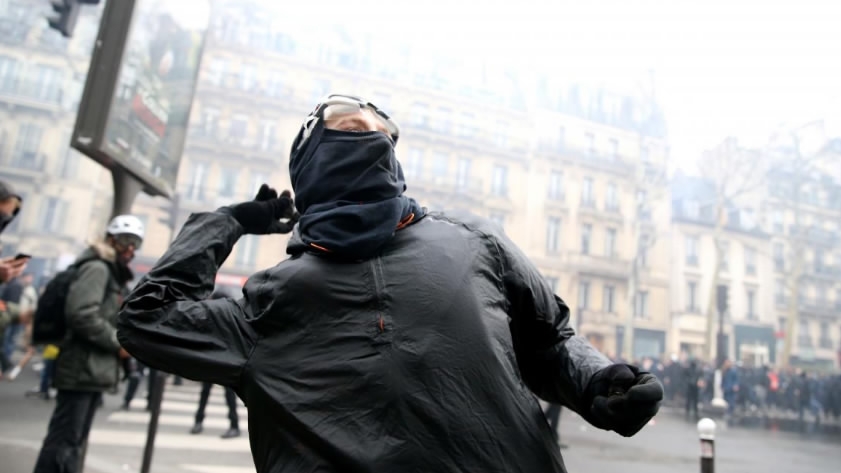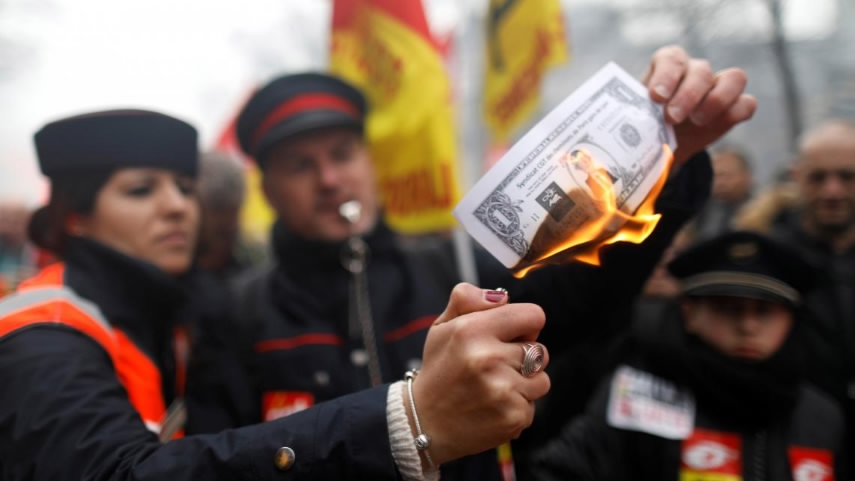
Politics
08:01, 23-Mar-2018
Trains, flights grounded in strikes against France reforms
CGTN

Tens of thousands of people took to the streets across France on Thursday to protest labor reforms, causing widespread travel disruption and bringing brief clashes with police in some cities.
Seven unions representing staff in the public sector led the strikes and protests and some railway workers walked out to join the demonstrations against proposals to trim some retirement benefits, overhaul unemployment insurance and shake up France's highly indebted state-run rail company,
It was the first time public sector workers, ranging from air-traffic controllers to nurses and teachers, had joined with rail workers and pensioners to protest over the reforms Macron has sought to introduce since he took office last May.
While the vast majority of around 180 demonstrations nationwide were peaceful, scuffles erupted between police and hooded young protesters in Paris and the western city of Nantes, where security forces fired tear gas and water cannon.
“We’re here against the government, which is only helping the rich. What this government is doing is simply not OK,” said 65-year-old pensioner Francoise Rauch, a former rail worker who said she was also protesting against higher taxes on pensions.
About 323,000 public sectors walked off the job, according to the interior ministry. Unions put the figure at 500,000.

French riot police use water cannons during clashes with masked protesters attending a demonstration during a national day of action against reforms in Paris, France, March 22, 2018. /Reuters Photo
French riot police use water cannons during clashes with masked protesters attending a demonstration during a national day of action against reforms in Paris, France, March 22, 2018. /Reuters Photo
In Paris, protesters denounced Macron’s proposals to trim some retirement benefits, overhaul unemployment insurance and shake up the highly indebted state-run rail company SNCF, with some chanting: “Together, let’s derail Macron!”
But only 13 percent of central government workers walked off the job, down marginally from an October strike, the government said, in a sign that unions may still be struggling to raise the stakes against the president.
Turnout was much stronger among railway staff, who halted 60 percent of fast trains and 75 percent of inter-city services, while 30 percent of flights to and from Paris airports were canceled.
“It’s a real mess,” said Didier Samba, who missed his morning commuter train to the Paris suburbs and had more than an hour’s wait for the next.
Public sector workers are angry with plans to cut the public sector headcount by 120,000 by 2022, including via voluntary redundancies, and oppose the introduction of merit-based pay.
Railway workers are worried by government plans to scrap job-for-life guarantees and automatic annual pay rises.
While rail staff have planned a three-month rolling strike starting on April 3, public sector workers have no plans yet for further action, but they will meet next week to consider it.

Railway workers and protesters attend a demonstration during a national day of strikes and protests against reforms in Paris, France, March 22, 2018./ Reuters Photo
Railway workers and protesters attend a demonstration during a national day of strikes and protests against reforms in Paris, France, March 22, 2018./ Reuters Photo
About 13.5 percent of teachers walked off the job, the government said, closing many primary schools. Electricity generation dropped by more than three gigawatts, the equivalent of three nuclear reactors’ output, as power workers joined the strike in sympathy.
Opinion polls show a paradox: a majority of voters back the strike but an even bigger majority back the reforms, including cutting the number of public sector workers and introducing merit-based pay.
That has led the government, which overhauled labor laws last year and is crafting other reforms, to say it will stand by its plans while keeping a close eye on protests.
On Tuesday, following a retirees’ march, Prime Minister Edouard Philippe said the government would change tack for the poorest 100,000 out of 7 million pensioners concerned by the tax rise, in a sign that a government that prides itself on being firm on reforms can make exceptions.
“What we need to avoid is that all the grievances fuse together, as was the case in 1995,” a government official said, referring to France’s biggest strike in decades, which forced the government at the time to withdraw reforms.
8226km
Source(s): Reuters

SITEMAP
Copyright © 2018 CGTN. Beijing ICP prepared NO.16065310-3
Copyright © 2018 CGTN. Beijing ICP prepared NO.16065310-3